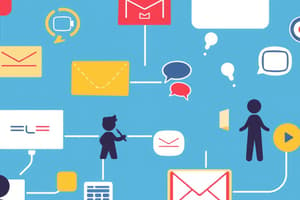Podcast
Questions and Answers
What is the definition of media as coined by Lynch (2018)?
What is the definition of media as coined by Lynch (2018)?
- Media refers to all artistic visuals used to transmit messages.
- Media refers to all electronic or digital means used to transmit messages.
- Media refers to all print materials used to transmit messages.
- Media refers to all electronic or digital means, print or artistic visuals used to transmit messages through reading, seeing, hearing, and playing/changing. (correct)
What is the importance of media literacy in education?
What is the importance of media literacy in education?
- Media literacy skills are included in the educational standards in language arts, social studies, health, science, and other subjects. (correct)
- Media literacy is not included in any educational standards.
- Media literacy is only important for adults.
- Media literacy is only important in language arts.
What does it mean to be media literate?
What does it mean to be media literate?
- Being media literate means only being able to create media.
- Being media literate means being able to access, analyze, evaluate, and create media. (correct)
- Being media literate means having a superficial understanding of the media.
- Being media literate means only being able to analyze media.
What are the components of active learning strategies that include media?
What are the components of active learning strategies that include media?
What is the main goal of media literacy, according to the Ontario Ministry of Education (1989)?
What is the main goal of media literacy, according to the Ontario Ministry of Education (1989)?
What are the types of media through which messages can be transmitted?
What are the types of media through which messages can be transmitted?
What is the primary purpose of media literacy for 21st Century Learners?
What is the primary purpose of media literacy for 21st Century Learners?
Which of the following is NOT considered a component of media literacy?
Which of the following is NOT considered a component of media literacy?
Which of the following skills is NOT associated with media literacy?
Which of the following skills is NOT associated with media literacy?
What is the main educational standard for media literacy?
What is the main educational standard for media literacy?
Which of the following is NOT a reason why media literacy is important?
Which of the following is NOT a reason why media literacy is important?
What is the primary effect of unconscious media consumption on individuals?
What is the primary effect of unconscious media consumption on individuals?
What is the main focus of the Critical Media Literacy Approach?
What is the main focus of the Critical Media Literacy Approach?
What are the two steps prescribed by Canada’s Center for Digital and Media Literacy for creating objectives and assessment tools?
What are the two steps prescribed by Canada’s Center for Digital and Media Literacy for creating objectives and assessment tools?
How can Media Literacy be evaluated based on the depth and quality of a student’s inquiry?
How can Media Literacy be evaluated based on the depth and quality of a student’s inquiry?
What are the important components of Media Literacy?
What are the important components of Media Literacy?
Which of the following is NOT a skill associated with Media Literacy?
Which of the following is NOT a skill associated with Media Literacy?
What role do educational standards play in Media Literacy?
What role do educational standards play in Media Literacy?
Flashcards are hidden until you start studying
Study Notes
Media Literacy
- Media refers to all electronic or digital means and print or artistic visuals used to transmit messages through reading, seeing, hearing, and playing/interacting.
- Media literacy is the ability to access, analyze, evaluate, and create media.
- Media literate individuals can understand the complex messages received from various forms of media, including television, radio, internet, newspapers, magazines, books, billboards, video games, music, and more.
Importance of Media Literacy
- Media literacy is necessary to function as a smart consumer of information in the 21st century.
- It helps individuals recognize varied points of view, analyze motives, deduce implied meanings, evaluate the overall significance and success of a product, and make informed decisions.
- Media literacy protects consumers from manipulation and allows them to be informed citizens who make conscious and educated decisions about what they value and trust.
Media Literacy Concepts
- Ability to critically assess the accuracy and validity of information transmitted by the mass media and produce information through various forms.
- Critical media literacy approach focuses on ideology critiquing, analyzing the politics of representation, incorporating alternative media production, and expanding textual analysis to include social contexts, control, resistance, and pleasure.
Assessing and Evaluating Media Literacy
- Media literacy work should be evaluated to assess quality based on standards.
- Students need regular feedback to reflect on their progress and develop mastery.
- Evaluation can be done in three ways: understanding key concepts, depth and quality of inquiry and analysis, and application of technical skills.
Key Concepts for Media Literacy
- Ability to identify different types of media from a wide array of sources and understand the messages they bring.
- Critical thinking and analysis of media messages.
- Understanding the authority, artistic decisions, intended audience, varied interpretations, and purpose behind the message.
- Recognition of how media sources affect opinions, behavior, and relationships.
Studying That Suits You
Use AI to generate personalized quizzes and flashcards to suit your learning preferences.




